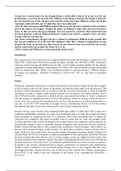George has a season ticket for the Dragon theatre, which allows him to sit in any seat for any
performance. Last week he took his wife, Mildred, to the theatre with him. He bought a ticket for
her. He paid for one of the cheapest seats and they both noted that Mildred’s ticket stated that
‘customers must sit in the seat to which they have been allocated.’
After the interval, George and Mildred noticed that several of the more expensive seats in a better
part of the theatre were empty. Despite the notice on Mildred’s ticket, they moved to the better
seats. As they sat down, the seats collapsed. This was caused by a defective floor board that had
not been properly repaired. Mildred suffered a broken arm and her expensive dress was torn.
George suffered a broken leg.
The owners of the theatre, Dragon Ltd, have refused to compensate Mildred on the grounds that
she was not entitled to sit in the seat that collapsed. They have refused to compensate George
because the work on the defective floor board was not done by their own staff, but was carried
out the week before the accident by Floors-R-Us Ltd.
Advise George and Mildred as to their potential claims in tort.
Introduction
The scenario gives rise to questions of occupiers liability both under the Occupiers Liability Act 1957
(OLA 1957), which deals with visitors, and the Occupiers Liability Act 1984 (OLA 1984), which deals
with non-visitors. George and Mildred may be able to claim under occupiers liability for the damage
sustained as a result of the defective floor boards. S.1(2) OLA 1957 does not define occupier and instead
refers to common law rules. Wheat v Lacon held an occupier is a person who has a ‘sufficient degree
of control over premises’. Premises is defined in s.1(3)(a) OLA 1957 as ‘any fixed or moveable
structure’.
George
George has sustained a broken leg as a result of the defective floor boards. Dragon Ltd are the occupiers
in this instance as they are the owners of the theatre and therefore had control over the premises. The
premises could be the theatre itself, or it could even be the seat or the floor boards, as Wheeler held that
something as small as a ladder could constitute premises for the purpose of occupiers liability. S.1(2)
OLA 1915 refers to the common law to identify visitors, and common law defines a ‘visitor’ as someone
who has express or implied permission to be on the premises (Robson). George would classify as a
visitor, as he has a season ticket meaning that he can be on the premises to watch any performance in
any seat. S.2(1) OLA 1957 states that an occupier owes a ‘common duty of care’ to all of his visitors,
meaning that the duty of care arose automatically when George entered the theatre.
Dragon Ltd may argue that they have discharged their duty under 2.1(4)(b) OLA 1957 as they have
engaged an independent contractor, for a duty to be discharged under s.2(4)(b), the occupier must have
been reasonable in entrusting the work to a contractor, have taken reasonable steps to ensure the
contractor was competent, and taken reasonable steps to ensure that the work was properly done.
Gwilliam held that a duty will be discharged if the occupier checks the competence of the contractor by
ensuring their insurance status, as generally insurance companies only insure those who are competent.
Further, Naylor held that there is only a general duty sometimes to check insurance, only if there is an
obvious risk to visitors of injury, in this instance, it is likely there would have been an obvious risk of
injury. However, the scenario does not provide enough information regarding whether Dragon Ltd
checked Floors-R-US Ltd.’s insurance to make an assumption on this requirement. Haseldine held that
the more technical the work, the less onus is on the occupier, as they are unlikely to know if the work
has been completed to a competent standard. Haseldine is distinguished from Woodward, as Woodward
held that clearing ice off a step wasn’t very technical and therefore the onus on the occupier was greater.
In regards to the scenario, floorboard repair is largely considered to be technical work, and therefore
George’s claim is unlikely to be successful against Dragon Ltd, as this suggests that they have
discharged their duty. George, however, may be able to use the common law to bring a claim against
Floors-R-Us, as he ought to have the customers of the theatre in his contemplation (Donoghue v
Stevenson).




